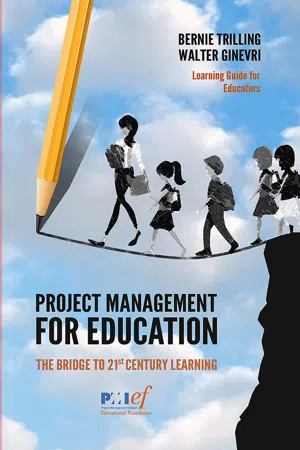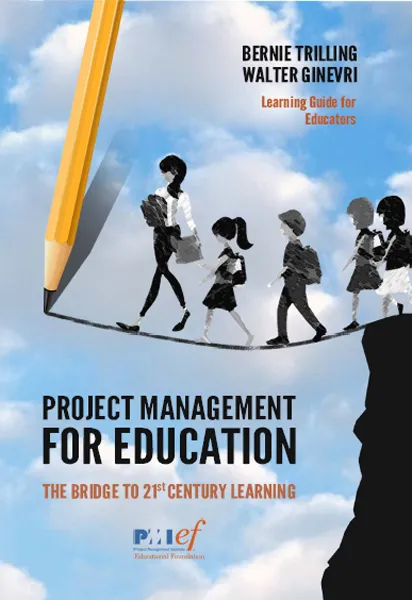![]()
![]()
PROJECT MANAGEMENT FOR EDUCATION
THE BRIDGE TO 21ST CENTURY LEARNING
Project Learning Guide for Educators
By Bernie Trilling and Walter Ginevri
![]()
Library of Congress Cataloging-in-Publication Data has been applied for.
ISBN: 978-1-62825-457-0
Published by: Project Management Institute, Inc.
14 Campus Boulevard
Newtown Square, Pennsylvania 19073-3299 USA
Phone: +6100-356-4600
Fax: +610-356-4647
Email:
[email protected]Internet:
www.PMI.orgBook cover designed by: Andrea Staricco
© 2017 PMI Educational Foundation. All rights reserved.
All proceeds from the book will go to the PMI Educational Foundation, the authors have graciously agreed to forgo any royalties.
NOTICE OF DISCLAMIER AND TERMS OF USE This publication is provided for informational and educational purpose only. The Project Management Institute Educational Foundation (PMIEF) makes no warranty, express or implied, as to the accuracy, completeness or usefulness of the information contained in this document. PMIEF further makes no warranty that the information in this document will fulfill any particular purpose. PMIEF disclaims liability for any damage, loss, injury or poor performance of any kind resulting directly or indirectly from the distribution, use, application or reliance on this document. Persons using the content of this document must rely upon their own judgment or the judgement of an appropriate professional as to the proper application of the information contained herein. The material in this publication is for noncommercial use only. The content of this publication may not be used for any other purpose without the express written permission of the PMIEF. Other usage may be granted by contacting PMIEF at
pmief.org. PMIEF, 14 Campus Blvd., Newtown Square, PA 19073-3299 USA, Tel: +1-610-356-4600. Fax: +1-610-356-0357, E-mail:
[email protected].
The Project Management Institute Educational Foundation logo, CAPM, PMP, PgMP, PMBOK and other marks that may be found in titles of PMIEF resources are marks of Project Management Institute, Inc.
![]()
Table of Contents
Educator Foreword
Educator Preface
Educator Author Page
Educator Introduction
What Does Project Management Bring to Education?
The Five Ps of Project Management for Education
Educator Chapter 1: Bringing Project Management into Classrooms and Homes
Why Is Project Management So Important to Student Success?
What's in It for Students?
What's in It for Educators?
What's in It for Parents?
Educator Chapter 2: Project Management as Learning, Work, and Life Skills
How Can Learning Projects Help All Students Become More Successful?
The Blood Project
Introductory Guide to Managing Learning Projects
Project Cycle Terms Overview
Projects Defined
Everyday Life Projects
Learning Projects and 21st Century Skills
Learning Project Phases
Project Learning Cycle Overview
Types of Learning Projects—Inquiry and Design
Types of Learning Projects—Debate and Expression
Educator Chapter 3: Project Based Learning (PBL) and Project Management (PM)
How Do PBL and PM Work Together?
Brief History of Project Based Learning (PBL)
Brief History of Project Management
PM + PBL = Future-Ready Students, Schools, and Societies
Educator Chapter 4: The Timeless Time Management Challenge
How Can We Help Students Tackle This Lifelong Motivational Challenge?
Time and the Speed of Thinking
Time Management = Motivation + Flow Management
Educator Chapter 5: Agile and Adaptive Learning Project Methods
How Can Adaptive Methods Build Engagement, Discovery, and Motivation?
Who and What “Drives” the Learning Project?
Learning Project Approaches—Prescriptive and Exploratory
Educator Chapter 6: Evaluating Projects—Products, Process, and Learning Progress
How Should Learning Project Outcomes Be Evaluated?
The Three-Legged Stool of Project Evaluation
Evaluating Product Results
Evaluating Project Processes
Evaluating Learning Progress
Educator Chapter 7: The Future of Project Management in Education
Project Management as a Bridge to 21st Century Education
Project Bridges to 21st Century Learning
A Learning Project Sampler
Primary Grades 3–5: Art Exhibit Project
Middle Grades 6–10: Olympic Stadium Design Project
Secondary Grades 9–12: Managing Science and Engineering Projects
Project Learning Resources
Key Learning Project Components Review
Project Management Pathways
21st Century Skills Descriptions
Project Method Frameworks Comparisons
Educational Research on Project Learning
Recommended Resources and Guides
Life, Learning, and Professional Project Glossary
![]()
Educator Foreword
by Jim Snyder, PMI Founder and Lifetime Innovator
As one of the founders of the Project Management Institute (PMI) back in the 1960s, I have long held a strong opinion that the only way for project management to reach its full potential in driving solutions to world problems was to create a generation of project-oriented people to solve project-oriented problems. The only way to achieve that objective would be to fully integrate project management skills into our K–12 educational programs. That means we must first have project-oriented educators—and this might be just a small problem! After all, business/industry and education are two very different worlds.
Project management is not rocket science, although there might not have been any rocket science without it! Project management—all that “stuff” that goes into the successful planning, organizing, executing, and delivery of successful project-oriented work—has become part of our everyday lives, and we acquire these skills in a very different way from most of our other life skills.
Like it or not, we have evolved to the point where most of our productive work takes the form of a project. Life is a series of continuing, overlapping, and interrelated projects. “Projects” are the way we get things done. Unlike many other skills, managing these various projects is important to our professional, social, and daily lives. The way we manage projects is not so very different from one environment to another, but we may acquire the skills we need to manage projects from very different sources.
Many of us had our first introduction to the world of project management in our professional lives when we found ourselves responsible for a major project. For many, it was an unexpected career change! We needed to learn quickly how to handle ourselves in the ever-changing and ever more complex world of projects. Our learning and knowledge base grew from our experiences in engineering, heavy construction, pharmaceuticals, aerospace, the military, and the oil and gas industries. The industrial acceptance and implementation of project management principles and practices soon spread to an ever-widening group of businesses and industries. Today, project management is a part of almost everything we do.
From the original industrial/business base, PMI developed A Guide to the Project Management Body of Knowledge (PMBOK® Guide), which set the language for engineering and business project management. And now, providers of project management training, education, and consulting are available, worldwide, to the engineering and business communities based on the language, processes, and practices that have developed from the early 1960s. This has become the language of professional project management.
But what about those other environments, such as education, our social lives, and our daily activities in which managing project-oriented work is just as important? A 2006 report by the Partnership for 21st Century Skills found the U.S. workforce “ill-prepared for the demands of today's (and tomorrow's) workplace.” Lacking were both basic skills and applied skills such as critical thinking, problem solving, oral communications, teamwork, leadership, and others—all components of the project management process. Studies like this one and others focused educators’ attention on project based learning (PBL), developed by the Buck Institute for Education and many others. PBL is a teaching method that engages students in learning through participation in interdisciplinary projects. As the process and implementation of PBL cont...

